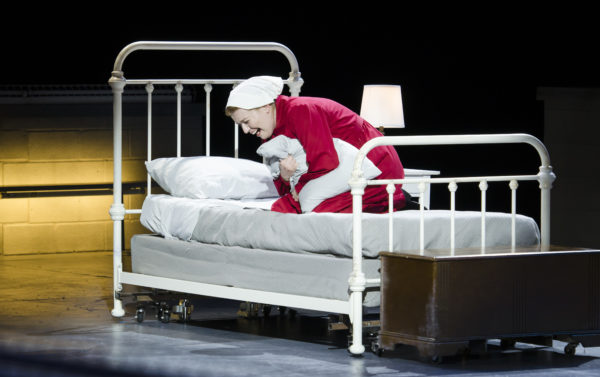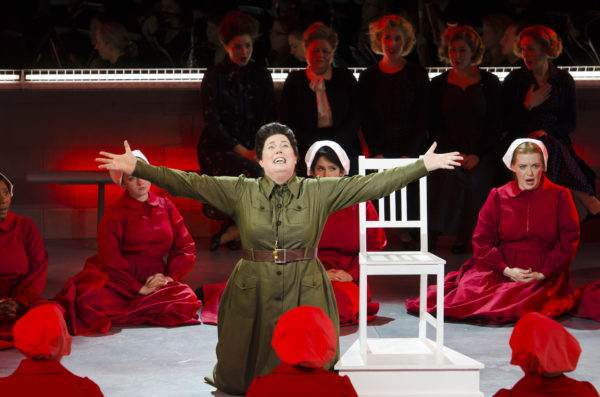Opera Review: BLO’S “Handmaid’s Tale” — Sublime Dystopia
By Katrina Holden-Buckley
The perversity of The Handmaid’s Tale oppressive allegory lends itself well to opera, and Boston Lyric Opera makes the most of the material’s emotional heights and depths.
The Handmaid’s Tale Music by Poul Ruders. Libretto by Paul Bentley. Based on the novel by Margaret Atwood. Sung in English with English surtitles. Directed by Anne Bogart. Staged by Boston Lyric Opera at Harvard University Ray Lavietes Pavilion, 45 North Harvard Street, Boston, MA through May 12.

Offred (Jennifer Johnson Cano) despairs over the fate of her daughter in Boston Lyric Opera’s production of “The Handmaid’s Tale.” Photo: Liza Voll.
Boston Lyric Opera’s ambitious production of Poul Ruders’ The Handmaid’s Tale is an adaptation that transforms its the original source into a journey that stands on its own. Margaret Atwood’s first-person speculative fiction is set in the repressive world of Gilead, located in a dystopian future America controlled by an oppressive religious regime that battles against environmentally-caused infertility with radical fervor. Female bodies have been decreed to be be nothing more than vessels for impregnation.
The perversity of the narrative’s oppressive allegory lends itself well to opera. The pretense and stylish artifice of Gliead’s masculine power play is nothing if not hyperbolically heightened. Yet woven through the extremity is the intimate story of the entrapment — followed by the resilience — of the story’s protagonist, Offred. The political relevance of the material’s focus on the terrors of misogyny generated enormous buzz about this Boston premiere, along with the popularity of the acclaimed Hulu series based on the book, which is now between seasons. The Boston Lyric Opera production lives up to the hype — it is an impressively chilling achievement.The dramatic proceedings, directed by Anne Bogart, are consistently engaging and compelling, the orchestra tautly led by David Angus, and the singing superb.
BLO still does not have a theatrical home, and it chose Cambridge’s Lavietes Pavilion for its recreation of the fictional world of Gilead. The curtain speech made the point that the choice of venue was intentional. This academic setting was the place Atwood had in mind when she created the Red Center. The training ground for the Handmaids is located at a college campus gymnasium in what is later revealed in the novel to be Cambridge. The production team has transformed the gym floor into a mostly metallic theater-in-the-round with a large orchestra at its side. Set pieces are sparse: small furniture pieces are used to delineate the action between rooms and flashbacks. Metallic benches circle the stage; scenes are divided via the sound of a prison buzzer. Barbed wire fences sit in and out of our field of vision.
For the opera’s considerable number of large ensemble numbers, the handmaids, in their signature red frocks, are the set pieces. Their elegantly precise movements, crafted by Shura Baryshnikov, embody the “group think” of a brainwashed women. The story line is filled with artfully dramatized though grim twists and turns, the horrifying doings including lynchings, ritual rapes, mob killings, and various other abuses. Lynched bodies were glimpsed via projections — until near the end, when the audience witnessed two hangings. The nooses flew away as the handmaids reached for the falling bodies.
The strains of Poul Ruders’ score enhanced the elements of terror; his music is always the focal point of Gilead’s heightened reality. Riveting dissonant sweeps accompanied every flashback in which we saw Offred and her family being separated at the Canadian border. This traumatic scene became haunting — it was repeated at least three times. Thrumming rhythmic drones were used during the childbirth ritual scene. Seedy jazz strains usher us into “Jezebelles,” a hotel converted into an underground brothel, where Offred encounters her friend Moira for the last time. Their farewell is sung to a moving variation on “Amazing Grace,” which is also heard in an earlier flashback featuring Serena Joy when she was a TV personality. Paul Bentley’s libretto impressively dramatized Offred’s first person narration in Atwood’s dense novel. Much of the action gives us Offred sitting quietly — trapped in the turmoil of her mind. Her aria in the second half evokes the novel’s moon imagery; Offred is hoping each month to become pregnant; it is the only way she can be saved from being sent to the Colonies.
The end of the opera, though the same as in the novel, feels a tad abrupt after so much detail. Librettist and composer tried to mitigate the sudden shock of conclusion by bringing in an ensemble of layered individual monologues just before Offred walks off to an unknown fate. The problem is that the collection of voices was very difficult to follow, vocally and textually. The creative choice slowed down the action, but it didn’t flow well and felt like an afterthought. In contrast, the final gesture was very effective. Offred’s hopes in her final moments — either toward liberation or death — were beautifully drawn out by the orchestra’s move into heated dissonance.
This is Offred’s tale and opera, and Jennifer Johnson Cano delivers memorably. Rarely leaving the stage, she has mastered an emotionally fraught libretto as well as a musically challenging score. Cano brings a beautiful, shimmering pianissimo to her more introspective moments and and an impressive vocal stamina to the role’s more bombastic heights. Throughout, she skillfully conveys Offred’s grief, distrust, and reluctant persistence.
Caroline Worra, as the handmaids’ trainer Aunt Lydia, maintains an intensely menacing presence physically and vocally by way of an exacting diction even in a fairly high tessitura. Felicia Gavilanes as Offred in flashbacks also brought considerable pathos to her role. Her duet with Johnson Cano — as they recall her lost daughter — is a well-rendered and emotionally moving highlight.

Aunt Lydia (Caroline Worra) prepares the handmaidens for a birthing ritual in Boston Lyric Opera’s production of “The Handmaid’s Tale.” Photo: Liza Voll.
David Cushing was appropriately lecherous as the Commander, who was instrumental in creating the new society. His vocal over-darkening and occasional lack of control, while not conventionally ‘beautiful,’ worked without too much distraction.
Dana Beth Miller, vocally resolute as Offred’s mother, come off as a bit too angry in her first scene, when she is accuses Offred of lapsing from her feminism by settling down and getting married. The character becomes somewhat one-note in her hectoring. There is insufficient build-up to the figure’s eventual panic and anger at the collapse of rational society.
Amid the BLO’s large cast, smaller parts that shine include Chelsea Basler as the rebel Moira, Kathryn Skemp Moran as the unhinged and often childishly pathetic Janine, Matt DiBatista as the unctuous doctor who casually offers to impregnate Offred, Omar Najmi as Nick, Michelle Trainor as Ofglen, and Vera Savage as the New Ofglen. As handmaids and Marthas, female choristers sang and moved beautifully — and sneered effectively when appropriate.
The handmaids may repeatedly chant “I am empty,” but this is an opera that is full. Its subject matter is not for the faint of heart, but Atwood’s political, biological, and psychological horrors are treated with artistry and depth. BLO’s cast and production team never lets up in their commitment to the emotional savagery and nuance of Atwood’s indelible warning.
Katrina Holden, soprano, has appeared with Boston Lyric Opera, Odyssey Opera, MassOpera, and Connecticut Lyric Opera, as well as in concert throughout the country and abroad. A graduate of The New England Conservatory and Muhlenberg College, she has written for Boston Singers’ Resource, Classical Singer Magazine, and The Theatre Times.
Tagged: Anne Bogart, Margaret Atwood, Paul Bentely, Paul Ruders
